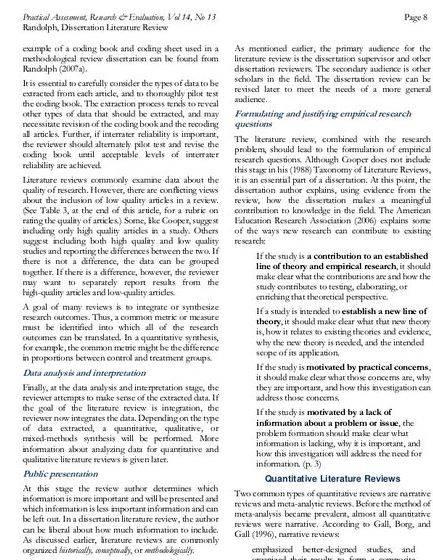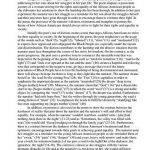You’ve watched other classmates sweating over their dissertation topics, poring over the literature, agonizing over their research design, writing and editing. Now, it’s your turn.
But, when and how do you begin?
Ideally, dissertation advisers say, students identify a research interest in the first or second year of their program and then use that general area as a theme throughout their coursework. But students don’t need to view that general area as a trajectory of their career. Instead, experts encourage students to view the dissertation as a teaching exercise, in which they learn how to conduct, design and analyze independent research.
So first off, you need a topic.
“The topic is the foundation for everything-with a good topic and research question, you’ll be set to go,” says Melinda Stoops, PhD, a director of the counseling center at Framingham State College in Framingham, Mass. who has spoken at APA conferences on writing the dissertation.
Experts offer the following advice on tackling these beginning stages of your dissertation-from getting organized to narrowing your topic to identifying your problem and research questions.
Then, take it one chapter at a time, dissertation advisers say.
When deciding your topic, keep in mind that you will undoubtedly spend the next few years immersed in it, says psychologist John Cone, PhD, a professor emeritus at Alliant International University (AIU) and co-author with Sharon Foster, PhD, of “Dissertations and Theses from Start to Finish ” (APA, 1993). Cone advises the following steps to pick a topic:
Ask a favorite professor, preferably one active in research, about possible topics.
Read departmental information on the research interests of the faculty to find a topic a faculty member is interested in as well.
Consider asking the faculty member to be a part of your dissertation committee, which will help guide you in your research.
Read an empirical paper that interests you and see what future research is suggested in the discussion section.
Think about term papers you enjoyed writing and choose a topic that reflects those interests.
Sift through literature reviews in your areas of interest-such as in the Annual Review of Psychology, Psychological Bulletin and Clinical Psychology Review.
Avoid topics in which you are overly emotionally involved-such as research on depression if you or a family member is depressed. Such emotional elements can interfere with your research, Cone says.
To narrow your focus, identify what within your chosen topic area interests you, says Foster, a psychology professor at AIU. Bounce ideas off a mentor and consult the literature to determine what has been done before, she advises. Also, consider choosing a topic that you’ve already been exposed to, such as through your master’s thesis or a research project.
That’s exactly what sixth-year doctoral student Jody Ernst did. Ernst-who is in the University of Texas at Austin’s individual differences and evolutionary psychology program-has spent her entire graduate career researching behavioral genetics.
“Selecting the topic sort of fell into place naturally as a product of the research I have been doing for the past five years,” Ernst says.

In particular, her dissertation investigates the genetic factors that influence problem behavior development over the life span.
“It is helpful to choose a topic that builds upon past work you have done,” Ernst says. “I think this makes the process of identifying the big questions much easier because you are already familiar with the relevant literature.”
But, make sure you have passion for the topic. Nate Tomcik-a fifth-year doctoral student in the clinical psychology program at the University of Tennessee-has an interest in his research on therapists’ views of couples therapy because it allowed him to integrate research with his clinical work with couples.
“My advice would be to not choose a topic that is an unappealing offshoot of your adviser’s work or a project that you have lukewarm feelings about in general,” Tomcik suggests. “It’s important to remember that the dissertation is a marathon, not a sprint, and lukewarm feelings can turn cold quickly.
“If I didn’t love my dissertation idea as much as I do, I know it would have been much harder to stay on track and focused,” he adds.
CONDUCTING THE LIT REVIEW
Once you’ve identified a topic, the next step is to write a review of the literature in the area. The lit review section will include a brief introduction to your topic, introduce key concepts and review the existing literature.
But be prepared: The lit review often is the most difficult part of the dissertation, Foster maintains.
“Sometimes you are going to feel lost and like you don’t know where you’re going,” Foster says. “The reason for that is because you are trying to do several things concurrently-you’re trying to learn about this whole field and get a conceptual framework of how to map out this area of research.”
But, it’s nothing your classes haven’t prepared you to take on, Foster says.
Cone and Foster also suggest that students:
Determine how experts in the field have organized their thinking by reading chapters or integrative articles they’ve written.
Find meta-analyses, journal articles or books on the topic and scan their reference sections for other references.
Identify key journals that cover the topic and scan their table of contents from the past five years for material.
Search electronic bibliographies-such as PsycINFO (which contains nearly 2 million citations of journal articles, books and dissertations in psychology) or the Education Resources Information Center, or ERIC, which offers a database of journal and other education literature.
Identify major authors in the area and search for them by name in databases, such as PsycLIT, to determine if they’ve written on other related items.
Determine if related research might be published under different keywords.
For example, Foster says in her research on girls’ aggression, “aggression” as a keyword didn’t cover it. Without trying other keywords, she would have missed key information on “delinquency” and “conduct disorders,” which use similar criteria to define the population.
Jennifer Reese-a fourth-year doctoral student in the PsyD program at the University of Denver-used what she calls the “scavenger hunt” approach for her lit review; she scanned reference sections of relevant books and journal articles and then found those referenced sources as well. She is validating the use of Jane Elliott’s Blue Eyes Brown Eyes exercise, a behavior training method that uses discrimination against a person’s eye color to teach Caucasians about prejudice and oppression. Reese even spoke with Elliott-a retired schoolteacher who created the experiment in the 1960s-to get background on what similar studies had been done.
So how do you know when you’ve gathered enough for your lit review? “I know when I go to the reference sections, and I’m not finding any new things-when I keep turning up the same things over and over again,” Foster says.
IDENTIFYING THE PROBLEM AND QUESTIONS
Once you feel confident that you’ve covered the literature, identify the rationale for your study, why it’s important and what hasn’t been studied about it before, Foster says.
To do that, Cone suggests writing a paragraph or two summarizing the literature review. Then, determine what unresolved issues are identified in the most recently cited studies-and most relevant to your study. Select one of these issues and formulate one or two research questions and associated hypotheses.
When formulating the research question, consider whether you’ll be able to recruit enough participants, Stoops says. Ask your dissertation committee-which usually comprises three or four faculty members you choose when you first begin your dissertation-for feedback on whether they believe you’ll be able to recruit enough participants or obtain animals, if needed, dissertation advisers suggest.
After her extensive lit review, Ernst was able to pinpoint her research questions for her dissertation on problem behavior development, including: Are there predictable developmental trajectories for problem behaviors? What factors influence the development of problem behaviors for vulnerable individuals across the life span? She identified these questions by finding the gaps within the problem behavior development literature.
Both the statement of the problem and research questions will be lumped in the introduction of your dissertation, which provides an overview of your study. But, while the introduction is sometimes the first chapter in your dissertation, don’t feel compelled to have it be the first thing you do, says Framingham State College’s Stoops. She didn’t write her introduction until after doing her lit review and methodology.
However, Ernst wrote her statement first and then continually added relevant citations as she came upon them.
“Writing the intro first helped me to organize my thoughts about gaps in current research and helped me to identify what new and relevant information I would be adding to this line of research,” she says.
Whatever methods you choose, even these beginning stages to your dissertation may seem overwhelming. So treat your dissertation as a job, Cone advises. He suggests committing 10 to 20 hours per week for 12 to 18 months to avoid becoming a casualty to the All But Dissertation (ABD) label. Set specific work hours and choose a specific place to work, he advises.
And tap the guidance of others-such as professors, peers or other mentors-who can help you through the process, Foster adds. (For tips to finding a mentor, see Building mentorships for success .)
“People who are a little ahead of you in the process can be very helpful,” Foster says. “They will tell you what they’ve gone through and normalize your experience and give you leads.”
One way to get a peer network for your dissertation: Join the APAGS dissertation listserv.
Another is taking a class on the dissertation process. That certainly helped Chris Bernuth, a sixth-year counseling psychology doctoral student at University of Missouri-Columbia, to stay on track. The professor’s due dates and the class’s extra support prevented procrastination, he says.
“Very smart people can become ABD because they procrastinate or think they can write the dissertation in a couple of all-night sessions, and you cannot do that with a dissertation,” Foster says.
When Stoops was working on her dissertation, she combated tendencies to procrastinate by setting deadlines with her dissertation chair. One way to set those deadlines, Cone says, is to list each step in chronological order and then use it to create a milestone chart.
And most importantly, Cone says students can be confident about their ability to complete the dissertation.
“After all,” he says, “you have made it this far.”
The dissertation, start to finish
Worrying about the dissertation has caused many sleepless nights for graduate students. But fear not: This article is the first in a six-part gradPSYCH guide to starting, researching, writing and defending your dissertation.




 Critical analysis dissertation writing tips
Critical analysis dissertation writing tips Starting an effective dissertation writing group
Starting an effective dissertation writing group Writing your thesis dissertation and research
Writing your thesis dissertation and research Oise phd dissertations in economics
Oise phd dissertations in economics Cardiff university history dissertation sample
Cardiff university history dissertation sample






